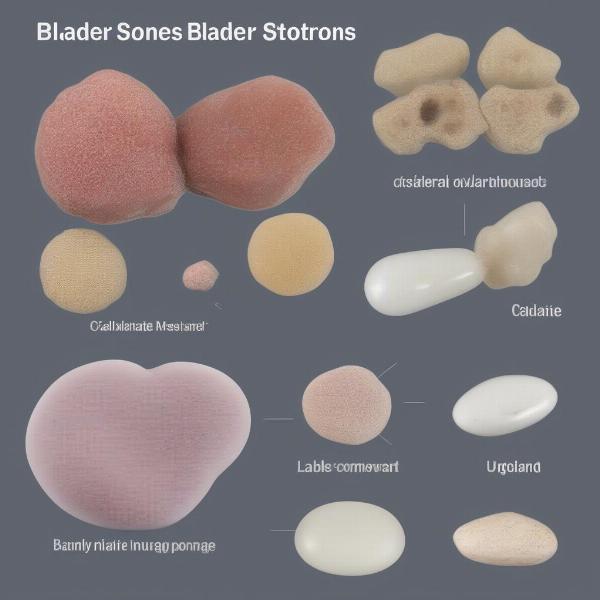Dog stones can refer to several different things, from health issues like bladder stones to decorative memorial stones. This article will explore the various meanings of “dog stones,” providing valuable information for dog owners on each topic. We’ll cover everything from identifying and treating health-related stones to choosing the perfect memorial for your beloved companion.
What are Dog Stones in a Medical Context?
In veterinary medicine, “dog stones” most commonly refers to uroliths, or bladder stones. These are mineral formations that develop in a dog’s urinary tract, including the kidneys, bladder, and urethra. Bladder stones can cause discomfort, pain, and even life-threatening blockages. Understanding the different types of dog stones, their causes, and treatment options is crucial for any dog owner.
 Types of Dog Bladder Stones
Types of Dog Bladder Stones
Several factors contribute to the formation of bladder stones, including diet, genetics, and underlying medical conditions. Some breeds are also more prone to developing stones than others. Symptoms can include frequent urination, straining to urinate, blood in the urine, and abdominal pain. If you notice any of these signs in your dog, it’s crucial to consult a veterinarian immediately.
Treating and Preventing Bladder Stones in Dogs
Treatment for bladder stones varies depending on the type and size of the stones. Some stones can be dissolved with specialized diets, while others require surgical removal. Your veterinarian will recommend the best course of action based on your dog’s individual needs. Preventive measures, such as dietary changes and increased water intake, can also help reduce the risk of recurrence.
Dog Stones for Water: Keeping Your Pup Hydrated
Another type of “dog stones” refers to decorative stones used in dog water bowls. These stones are typically made of smooth, non-porous materials and are placed at the bottom of the bowl. They can add a touch of style to your dog’s water station, but they can also serve a practical purpose. For brachycephalic breeds (dogs with short noses), drinking from a bowl with raised stones can make it easier to access the water without tilting their heads back too far.
However, it’s important to choose stones that are safe for your dog and to clean them regularly to prevent bacterial growth. Opt for stones that are large enough to prevent choking and made from non-toxic materials.
Dog Memorial Stones: Remembering a Beloved Companion
Finally, “dog stones” can also refer to memorial stones designed to honor the memory of a deceased pet. These stones come in a variety of shapes, sizes, and materials, and can be personalized with your dog’s name, dates, and a special message. A dog memorial stone can provide a tangible reminder of the love and companionship your dog brought into your life and can be a comforting presence in your garden or home.
Choosing the right memorial stone is a personal decision. Consider your dog’s personality, your personal style, and the location where you plan to place the stone.
Conclusion: Navigating the Different Meanings of “Dog Stones”
Whether referring to health concerns, hydration solutions, or memorials, understanding the different meanings of “dog stones” is important for every dog owner. By staying informed and proactive, you can ensure your furry friend’s health, happiness, and lasting memory.
FAQ:
- What are the most common types of bladder stones in dogs? Struvite, calcium oxalate, and urate are the most common types.
- How can I prevent my dog from developing bladder stones? Dietary changes, increased water intake, and regular veterinary checkups can help.
- Are stones in water bowls safe for dogs? Yes, as long as they are made of non-toxic materials, are large enough to prevent choking, and are cleaned regularly.
- What should I consider when choosing a dog memorial stone? Consider your dog’s personality, your style, and the location where you’ll place it.
- What are the symptoms of bladder stones in dogs? Frequent urination, straining to urinate, blood in the urine, and abdominal pain are common signs.
- How are bladder stones treated in dogs? Treatment varies depending on the type and size of the stones, ranging from specialized diets to surgery.
- Where can I find rhinestone dog harness? You can find them at pet stores or online retailers.
ILM Dog is a leading international website dedicated to providing expert advice and resources on all aspects of dog care and wellbeing. From breed selection and health to training, nutrition, and grooming, we offer a comprehensive guide for dog lovers worldwide. We also provide information on various dog accessories, like dog stones for water. For professional guidance or to learn more about our services, contact us at [email protected] or +44 20-3965-8624. ILM Dog is here to help you navigate every stage of your dog’s life.